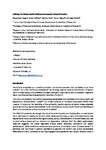Using the Mental Health Wellness Framework in dental practice
| dc.contributor.author | Plessas, Anastasios | |
| dc.contributor.author | Witton, R | |
| dc.contributor.author | Paisi, Martha | |
| dc.contributor.author | Ellwood, F | |
| dc.contributor.author | McColl, Ewen | |
| dc.date.accessioned | 2022-12-14T10:05:39Z | |
| dc.date.available | 2022-12-14T10:05:39Z | |
| dc.date.issued | 2022-11-18 | |
| dc.identifier.issn | 2054-7617 | |
| dc.identifier.issn | 2054-7617 | |
| dc.identifier.uri | http://hdl.handle.net/10026.1/20074 | |
| dc.description.abstract |
Dentistry is recognised as a stressful profession and dentists perceive their profession to be more stressful than other healthcare professions.1 An alarming upwards trend in deterioration of mental health and wellbeing in the profession has been observed in recent years, with up to 87% of UK general dental practitioners reporting symptoms indicative of burnout.2 The COVID-19 pandemic has further heightened anxiety levels in all members of the dental team and especially in frontline dental nurses.3,4,5 In a study conducted at the dental department within Guy's Hospital in London at the beginning of the pandemic, nearly a quarter of dental nurses displayed severe symptoms of generalised anxiety.3 So far, the evidence around mental health and wellbeing of dental care professionals other than dentists is limited.6 The COVID-19 pandemic has brought into sharp focus the importance of looking after our own mental health wellness and looking out for each other. Work-related stress, as well as life experiences, may expose dental team members to feelings of anxiety, worry, and stress which if not addressed may lead to more serious issues such as burnout and depression. Evidence from the wider psychological literature suggests that stress negatively affects teams' dynamics, behaviours and overall performance,7 whilst healthcare teams are more prone to errors when under immense stress.8 In dentistry, and healthcare in general, teamwork is essential and patient care cannot be delivered effectively if all team members are not fully engaged and empowered. With patient safety in mind, it is only logical that protecting your team's mental wellness will have a positive impact on team morale and in turn improve patient experience and safety. When it comes to preventing mental health and wellbeing issues in the workplace, three levels of intervention can be employed: primary prevention (ie system level interventions), secondary prevention (ie psychoeducational interventions) and tertiary prevention (ie counselling).5 These interventions can be delivered in turn at individual, practice or organisational and national level. Another paper in this issue of BDJ Team looks at individual level interventions to improve mental wellness, with emphasis given to early recognition of signs of poor mental health and early intervention. The current article aims to provide tips for dental teams to bring mental health wellness into the heart of their professional practice. The recommendations made in this paper are based on the Mental Health Wellness framework developed by the Dental Professional Alliance which can be accessed at: https://mhwd.org/download/mental-health-wellness-in-dentistry-framework/. We encourage readers to refer and consider implementing the framework into their practice and/or organisation. | |
| dc.format.extent | 10-12 | |
| dc.language | en | |
| dc.language.iso | en | |
| dc.publisher | Springer Science and Business Media LLC | |
| dc.title | Using the Mental Health Wellness Framework in dental practice | |
| dc.type | journal-article | |
| plymouth.issue | 10 | |
| plymouth.volume | 9 | |
| plymouth.publication-status | Published online | |
| plymouth.journal | BDJ Team | |
| dc.identifier.doi | 10.1038/s41407-022-1678-0 | |
| plymouth.organisational-group | /Plymouth | |
| plymouth.organisational-group | /Plymouth/Faculty of Health | |
| plymouth.organisational-group | /Plymouth/Faculty of Health/Peninsula Dental School | |
| plymouth.organisational-group | /Plymouth/Faculty of Health/School of Nursing and Midwifery | |
| plymouth.organisational-group | /Plymouth/REF 2021 Researchers by UoA | |
| plymouth.organisational-group | /Plymouth/REF 2021 Researchers by UoA/UoA03 Allied Health Professions, Dentistry, Nursing and Pharmacy | |
| plymouth.organisational-group | /Plymouth/Users by role | |
| plymouth.organisational-group | /Plymouth/Users by role/Academics | |
| plymouth.organisational-group | /Plymouth/Users by role/Researchers in ResearchFish submission | |
| dcterms.dateAccepted | 2022-03-30 | |
| dc.rights.embargodate | 2023-1-7 | |
| dc.identifier.eissn | 2054-7617 | |
| rioxxterms.versionofrecord | 10.1038/s41407-022-1678-0 | |
| rioxxterms.licenseref.uri | http://www.rioxx.net/licenses/all-rights-reserved | |
| rioxxterms.type | Journal Article/Review |


